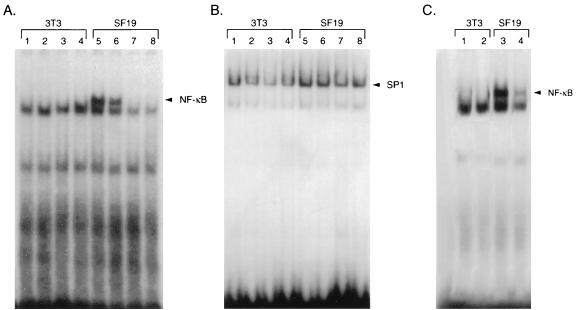FIG. 9.
Overexpression or decreased degradation of IκBα reduces NF-κB DNA-binding activity in SCID cells. A wild-type IκBα cDNA or an IκBα cDNA with mutations of serine residues 32 and 36 to alanine were cloned into adenovirus. These viruses and a control adenovirus containing the β-galactosidase gene were used to infect NIH 3T3 and SF19 cells at a multiplicity of infection of 10 and harvested 24 h later. Nuclear extracts were prepared from mock- and adenovirus-infected cells and subjected to gel retardation analysis with oligonucleotides containing NF-κB (A) or SP1 (B) binding sites. Gel retardation analysis was performed with nuclear extracts isolated from uninfected cells (lanes 1 and 5), cells infected with adenovirus containing the β-galactosidase gene (lanes 2 and 6), cells infected with adenovirus containing wild-type IκBα (lanes 3 and 7), and cells infected with adenovirus containing IκBα with serine residues 32 and 36 mutated to alanine (lanes 4 and 8). (C) NIH 3T3 (lanes 1 and 2) and SF19 (lanes 3 and 4) cells were treated with 50 μM TPCK (Sigma) for 45 min. Nuclear extracts were prepared from nontreated cells (lanes 1 and 3) and TPCK-treated cells (lanes 2 and 4) and subjected to gel retardation analysis with a double-stranded NF-κB binding oligonucleotide.

